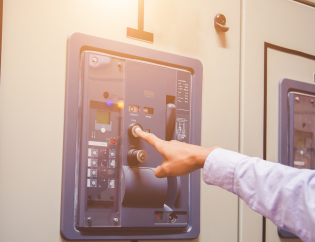Manual HVAC Control Panel Systems:
Manual HVAC control panels are traditional systems where the control of various HVAC functions is done manually. These panels consist of switches, knobs, and indicators that allow operators to adjust temperature, fan speed, and other settings.
Components and Functionality:
Manual control panels typically include switches for turning the system on/off, adjusting temperature settings, and controlling fan speed. They may also feature indicator lights to provide feedback on system status. These panels are straightforward in design and function, making them easy to understand and operate.
Advantages and Limitations:
-
Advantages:
-
- Simplicity: Manual control panels are easy to operate and require minimal training.
- Cost-effective: They are generally more affordable compared to controller-based systems.
- Reliability: Manual panels have fewer electronic components, reducing the risk of system failures.
-
Limitations:
- Limited control precision: Manual panels may not provide precise temperature or humidity control, leading to less precise comfort settings.
- Lack of automation: Manual panels do not offer automated scheduling or advanced programming capabilities.
- Limited integration: Manual panels may not integrate with building automation systems or allow remote monitoring and control.
Examples of Applications:
Manual HVAC control panels are commonly found in small residential buildings, single-zone commercial spaces, and simple HVAC systems with basic control requirements.
Controller-Based HVAC Control Panel Systems:
Controller-based HVAC control panels utilize advanced electronic controllers to automate and manage HVAC functions. These systems offer more precise control, automation capabilities, and integration options.
Features and Functionality:
Controller-based systems feature programmable logic controllers (PLCs), thermostats, or other advanced controllers. These controllers are equipped with sensors, algorithms, and programmable settings to regulate temperature, humidity, airflow, and other parameters.
Benefits and Advantages:
- Control Precision and Accuracy:
- Controller-based systems offer precise temperature control, allowing for greater comfort and energy efficiency.
- Advanced algorithms and feedback mechanisms maintain tight control over HVAC functions.
- Flexibility and Programmability:
- Controllers allow for customized programming, scheduling, and automation of HVAC functions.
- They can adapt to changing conditions, optimize energy usage, and ensure efficient operation.
- Integration with Building Automation Systems:
- Controller-based systems can integrate with building automation systems, enabling centralized control and monitoring.
- Integration facilitates data logging, remote access, and coordination with other building systems.
- Energy Efficiency and Optimization:
- Controller-based systems optimize HVAC operation, minimizing energy consumption and reducing utility costs.
- They can adjust operation based on occupancy patterns, weather conditions, and other factors.
Key Differences Between Manual and Controller-Based Systems:
To further understand the choice between manual and controller-based systems, it is essential to consider their differences across several aspects.
Control Precision and Accuracy:
- Manual systems may have limited precision and may rely on subjective human judgment.
- Controller-based systems offer precise control and maintain consistent temperature and humidity levels.
Flexibility and Programmability:
- Manual systems offer limited flexibility and lack advanced programmability.
- Controller-based systems allow for customized programming, scheduling, and automation.
Integration with Building Automation Systems:
- Manual systems may not integrate well with other building systems or provide remote access.
- Controller-based systems can integrate with building automation systems, enabling centralized control and monitoring.
Energy Efficiency and Optimization:
- Manual systems may lack energy-saving features and optimization capabilities.
- Controller-based systems optimize energy usage, adjust operation based on occupancy patterns and external conditions.
User-Friendliness and Ease of Operation:
- Manual systems are generally straightforward and easy to operate without extensive training.
- Controller-based systems may have a steeper learning curve but offer more advanced features and control options.
Factors to Consider When Choosing Between Manual and Controller-Based Systems:
When deciding which HVAC control panel system to choose, several factors should be taken into consideration:
System Complexity and Size:
- Manual systems are suitable for simpler, single-zone setups, while controller-based systems are more suitable for complex, multi-zone systems.
Budget and Cost Considerations:
- Manual systems are generally more affordable upfront but may lack long-term energy-saving benefits.
- Controller-based systems require a higher initial investment but can result in significant energy savings over time.
Desired Level of Automation and Control:
- Manual systems offer basic control capabilities but lack advanced automation and scheduling features.
- Controller-based systems provide precise control, automation, and programmability for optimal comfort and energy efficiency.
Future Scalability and Expansion:
- Consider whether future expansion or integration with other systems is anticipated, as controller-based systems offer greater flexibility for future needs.
Maintenance and Support Requirements:
- Controller-based systems may require specialized technical support and regular software updates.
- Manual systems are typically more straightforward to maintain but may require occasional component replacements.
Conclusion:
Choosing the right HVAC control panel system depends on various factors such as system complexity, desired control capabilities, and long-term energy-saving goals. While manual control panels are suitable for simpler applications, controller-based systems offer advanced control, automation, and integration features that enhance comfort, energy efficiency, and system management. Carefully evaluate your specific requirements and consult with HVAC professionals to determine the most appropriate HVAC control panel system for your needs.


